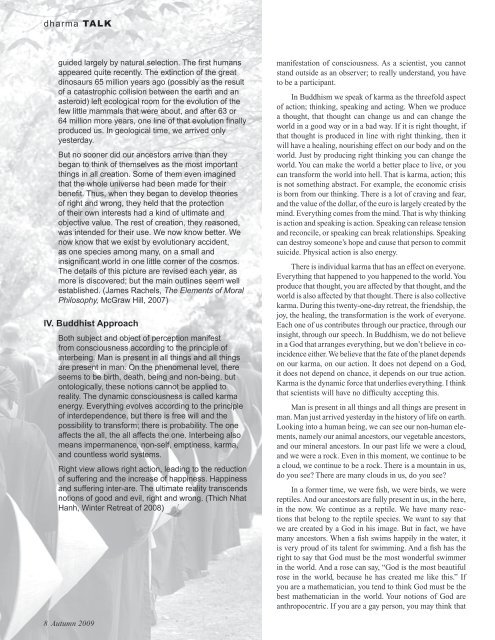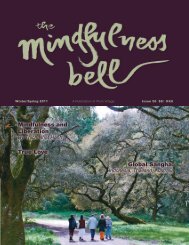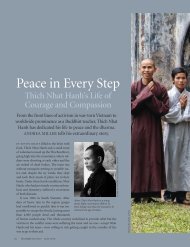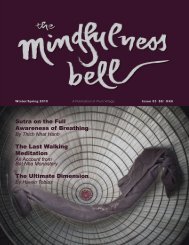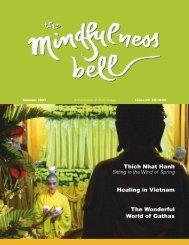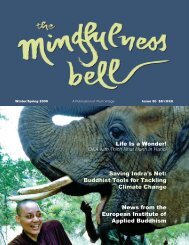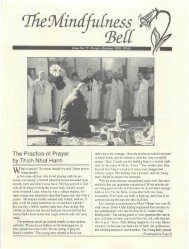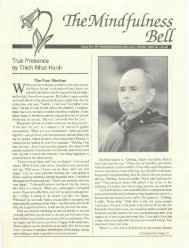View full issue in PDF - The Mindfulness Bell
View full issue in PDF - The Mindfulness Bell
View full issue in PDF - The Mindfulness Bell
- No tags were found...
You also want an ePaper? Increase the reach of your titles
YUMPU automatically turns print PDFs into web optimized ePapers that Google loves.
dharma TALKguided largely by natural selection. <strong>The</strong> first humansappeared quite recently. <strong>The</strong> ext<strong>in</strong>ction of the greatd<strong>in</strong>osaurs 65 million years ago (possibly as the resultof a catastrophic collision between the earth and anasteroid) left ecological room for the evolution of thefew little mammals that were about, and after 63 or64 million more years, one l<strong>in</strong>e of that evolution f<strong>in</strong>allyproduced us. In geological time, we arrived onlyyesterday.But no sooner did our ancestors arrive than theybegan to th<strong>in</strong>k of themselves as the most importantth<strong>in</strong>gs <strong>in</strong> all creation. Some of them even imag<strong>in</strong>edthat the whole universe had been made for theirbenefit. Thus, when they began to develop theoriesof right and wrong, they held that the protectionof their own <strong>in</strong>terests had a k<strong>in</strong>d of ultimate andobjective value. <strong>The</strong> rest of creation, they reasoned,was <strong>in</strong>tended for their use. We now know better. Wenow know that we exist by evolutionary accident,as one species among many, on a small and<strong>in</strong>significant world <strong>in</strong> one little corner of the cosmos.<strong>The</strong> details of this picture are revised each year, asmore is discovered; but the ma<strong>in</strong> outl<strong>in</strong>es seem wellestablished. (James Rachels, <strong>The</strong> Elements of MoralPhilosophy, McGraw Hill, 2007)IV. Buddhist ApproachBoth subject and object of perception manifestfrom consciousness accord<strong>in</strong>g to the pr<strong>in</strong>ciple of<strong>in</strong>terbe<strong>in</strong>g. Man is present <strong>in</strong> all th<strong>in</strong>gs and all th<strong>in</strong>gsare present <strong>in</strong> man. On the phenomenal level, thereseems to be birth, death, be<strong>in</strong>g and non-be<strong>in</strong>g, butontologically, these notions cannot be applied toreality. <strong>The</strong> dynamic consciousness is called karmaenergy. Everyth<strong>in</strong>g evolves accord<strong>in</strong>g to the pr<strong>in</strong>cipleof <strong>in</strong>terdependence, but there is free will and thepossibility to transform; there is probability. <strong>The</strong> oneaffects the all, the all affects the one. Interbe<strong>in</strong>g alsomeans impermanence, non-self, empt<strong>in</strong>ess, karma,and countless world systems.Right view allows right action, lead<strong>in</strong>g to the reductionof suffer<strong>in</strong>g and the <strong>in</strong>crease of happ<strong>in</strong>ess. Happ<strong>in</strong>essand suffer<strong>in</strong>g <strong>in</strong>ter-are. <strong>The</strong> ultimate reality transcendsnotions of good and evil, right and wrong. (Thich NhatHanh, W<strong>in</strong>ter Retreat of 2008)manifestation of consciousness. As a scientist, you cannotstand outside as an observer; to really understand, you haveto be a participant.In Buddhism we speak of karma as the threefold aspectof action; th<strong>in</strong>k<strong>in</strong>g, speak<strong>in</strong>g and act<strong>in</strong>g. When we producea thought, that thought can change us and can change theworld <strong>in</strong> a good way or <strong>in</strong> a bad way. If it is right thought, ifthat thought is produced <strong>in</strong> l<strong>in</strong>e with right th<strong>in</strong>k<strong>in</strong>g, then itwill have a heal<strong>in</strong>g, nourish<strong>in</strong>g effect on our body and on theworld. Just by produc<strong>in</strong>g right th<strong>in</strong>k<strong>in</strong>g you can change theworld. You can make the world a better place to live, or youcan transform the world <strong>in</strong>to hell. That is karma, action; thisis not someth<strong>in</strong>g abstract. For example, the economic crisisis born from our th<strong>in</strong>k<strong>in</strong>g. <strong>The</strong>re is a lot of crav<strong>in</strong>g and fear,and the value of the dollar, of the euro is largely created by them<strong>in</strong>d. Everyth<strong>in</strong>g comes from the m<strong>in</strong>d. That is why th<strong>in</strong>k<strong>in</strong>gis action and speak<strong>in</strong>g is action. Speak<strong>in</strong>g can release tensionand reconcile, or speak<strong>in</strong>g can break relationships. Speak<strong>in</strong>gcan destroy someone’s hope and cause that person to commitsuicide. Physical action is also energy.<strong>The</strong>re is <strong>in</strong>dividual karma that has an effect on everyone.Everyth<strong>in</strong>g that happened to you happened to the world. Youproduce that thought, you are affected by that thought, and theworld is also affected by that thought. <strong>The</strong>re is also collectivekarma. Dur<strong>in</strong>g this twenty-one-day retreat, the friendship, thejoy, the heal<strong>in</strong>g, the transformation is the work of everyone.Each one of us contributes through our practice, through our<strong>in</strong>sight, through our speech. In Buddhism, we do not believe<strong>in</strong> a God that arranges everyth<strong>in</strong>g, but we don’t believe <strong>in</strong> co<strong>in</strong>cidenceeither. We believe that the fate of the planet dependson our karma, on our action. It does not depend on a God,it does not depend on chance, it depends on our true action.Karma is the dynamic force that underlies everyth<strong>in</strong>g. I th<strong>in</strong>kthat scientists will have no difficulty accept<strong>in</strong>g this.Man is present <strong>in</strong> all th<strong>in</strong>gs and all th<strong>in</strong>gs are present <strong>in</strong>man. Man just arrived yesterday <strong>in</strong> the history of life on earth.Look<strong>in</strong>g <strong>in</strong>to a human be<strong>in</strong>g, we can see our non-human elements,namely our animal ancestors, our vegetable ancestors,and our m<strong>in</strong>eral ancestors. In our past life we were a cloud,and we were a rock. Even <strong>in</strong> this moment, we cont<strong>in</strong>ue to bea cloud, we cont<strong>in</strong>ue to be a rock. <strong>The</strong>re is a mounta<strong>in</strong> <strong>in</strong> us,do you see? <strong>The</strong>re are many clouds <strong>in</strong> us, do you see?In a former time, we were fish, we were birds, we werereptiles. And our ancestors are <strong>full</strong>y present <strong>in</strong> us, <strong>in</strong> the here,<strong>in</strong> the now. We cont<strong>in</strong>ue as a reptile. We have many reactionsthat belong to the reptile species. We want to say thatwe are created by a God <strong>in</strong> his image. But <strong>in</strong> fact, we havemany ancestors. When a fish swims happily <strong>in</strong> the water, itis very proud of its talent for swimm<strong>in</strong>g. And a fish has theright to say that God must be the most wonderful swimmer<strong>in</strong> the world. And a rose can say, “God is the most beautifulrose <strong>in</strong> the world, because he has created me like this.” Ifyou are a mathematician, you tend to th<strong>in</strong>k God must be thebest mathematician <strong>in</strong> the world. Your notions of God areanthropocentric. If you are a gay person, you may th<strong>in</strong>k that8 Autumn 2009


